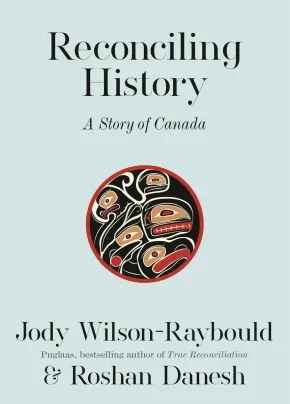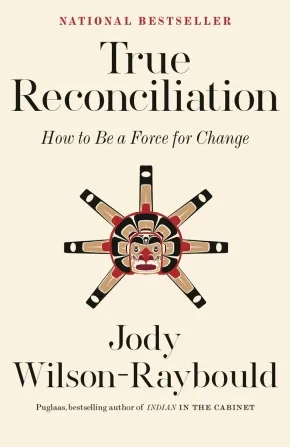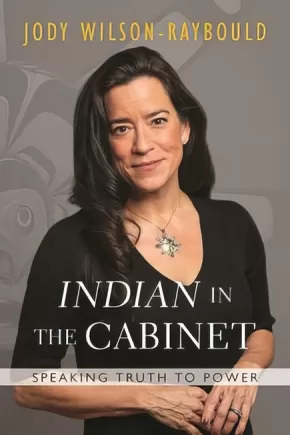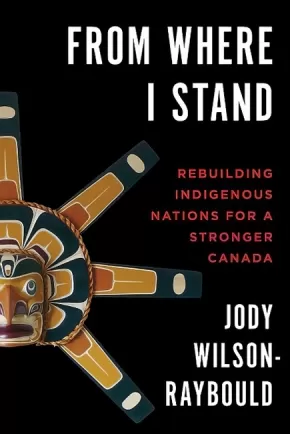Musgamagw Tsawataineuk
Synopsis:
From the #1 national bestselling author of 'Indian' in the Cabinet and True Reconciliation, a truly unique history of our land—powerful, devastating, remarkable—as told through the voices of both Indigenous and non-Indigenous peoples.
The totem pole forms the foundation for this unique and important oral history of Canada. Its goal is both toweringly ambitious and beautifully direct: To tell the story of this country in a way that prompts readers to look from different angles, to see its dimensions, its curves, and its cuts. To see that history has an arc, just as the totem pole rises, but to realize that it is also in the details along the way that important meanings are to be found. To recognize that the story of the past is always there to be retold and recast, and must be conveyed to generations to come. That in the act of re-telling, meaning is found, and strength is built.
When it comes to telling the history of Canada, and in particular the history of the relationship between Indigenous and non-Indigenous peoples, we need to accept that the way in which our history has traditionally been told has not been a common or shared enterprise. In many ways, it has been an exclusive and siloed one. Among the countless peoples and groups that make up this vast country, the voices and experiences of a few have too often dominated those of many others.
Reconciling History shares voices that have seldom been heard, and in this ground-breaking book they are telling and re-telling history from their perspectives. Born out of the oral history in True Reconciliation, and complemented throughout with stunning photography and art, Reconciling History takes this approach to telling our collective story to an entirely different level.
Additional Information
304 pages | 6.25" x 8.75" | Hardcover
Synopsis:
There is one question Canadians have asked Jody Wilson-Raybould more than any other: What can I do to help advance reconciliation? It is clear that people from all over the country want to take concrete and tangible action that will make real change. We just need to know how to get started. This book provides that next step. For Wilson-Raybould, what individuals and organizations need to do to advance true reconciliation is self-evident, accessible, and achievable. True Reconciliation is broken down into three core practices—Learn, Understand, and Act—that can be applied by individuals, communities, organizations, and governments.
The practices are based not only on the historical and contemporary experience of Indigenous peoples in their relentless efforts to effect transformative change and decolonization, but also on the deep understanding and expertise about what has been effective in the past, what we are doing right, and wrong, today, and what our collective future requires. Fundamental to a shared way of thinking is an understanding of the Indigenous experience throughout the story of Canada. In a manner that reflects how work is done in the Big House, True Reconciliation features an “oral” history of these lands, told through Indigenous and non-Indigenous voices from our past and present.
The ultimate and attainable goal of True Reconciliation is to break down the silos we’ve created that prevent meaningful change, to be empowered to increasingly act as “inbetweeners,” and to take full advantage of this moment in our history to positively transform the country into a place we can all be proud of.
Additional Information
352 pages | 5.17" x 7.99" | Paperback
Synopsis:
A compelling political memoir of leadership and speaking truth to power by one of the most inspiring women of her generation.
Jody Wilson-Raybould was raised to be a leader. Inspired by the example of her grandmother, who persevered throughout her life to keep alive the governing traditions of her people, and raised as the daughter of a hereditary chief and Indigenous leader, Wilson-Raybould always knew she would take on leadership roles and responsibilities. She never anticipated, however, that those roles would lead to a journey from her home community of We Wai Kai in British Columbia to Ottawa as Canada’s first Indigenous Minister of Justice and Attorney General in the Cabinet of then newly elected prime minister, Justin Trudeau.
Wilson-Raybould’s experience in Trudeau’s Cabinet reveals important lessons about how we must continue to strengthen our political institutions and culture, and the changes we must make to meet challenges such as racial justice and climate change. As her initial optimism about the possibilities of enacting change while in Cabinet shifted to struggles over inclusivity, deficiencies of political will, and concerns about adherence to core principles of our democracy, Wilson-Raybould stood on principle and, ultimately, resigned. In standing her personal and professional ground and telling the truth in front of the nation, Wilson-Raybould demonstrated the need for greater independence and less partisanship in how we govern.
"Indian” in the Cabinet: Speaking Truth to Power is the story of why Wilson-Raybould got into federal politics, her experience as an Indigenous leader sitting around the Cabinet table, her proudest achievements, the very public SNC-Lavalin affair, and how she got out and moved forward. Now sitting as an Independent Member in Parliament, Wilson-Raybould believes there is a better way to govern and a better way for politics—one that will make a better country for all.
Additional Information
352 pages | 6.00" x 9.00" | Hardcover
Synopsis:
An Indigenous leader who has dedicated her life to Indigenous Rights, Jody Wilson-Raybould has represented both First Nations and the Crown at the highest levels. And she is not afraid to give Canadians what they need most – straight talk on what has to be done to deconstruct the colonial legacy and achieve true reconciliation in Canada.
In this powerful book, drawn from Wilson-Raybould’s speeches and other writings, she urges us all – governments, Indigenous Nations, everyone – to build upon the momentum already gained in the reconciliation process or risk hard-won progress being lost. The choice is stark: support Indigenous-led initiatives for Nation rebuilding or revert to governments just managing “the problem.” Frank and impassioned, she also argues that true reconciliation will never occur so long as governments deny Indigenous Peoples their rights and the Indian Act continues to exist. Until then, we’ll be stuck in the status quo – mired in conflicts and expensive court cases that do nothing to improve people’s lives or heal the country.
The good news is that Indigenous Nations already have the solutions. Now it is time to act and build a shared future based on the foundations of trust, cooperation, good governance, and recognition. Removing the barriers that are keeping these solutions from being put into effect will not only empower Indigenous Peoples – it will enrich all Canadians and make Canada stronger.
From Where I Stand is indispensable reading for anyone who wants to dig deeper into the reconciliation process and know what they can do to make a difference, from engaged citizens and students to leaders and policy-makers, educators and academics, and lawyers and consultants.
Reviews
"From Where I Stand is a must-read book for all Canadians. Puglaas shares a clear understanding of where we have come from, the issues we must address, and the pathways to a transformed future. Having witnessed her remarkable courage and capacity as Canada’s attorney general and her determination to do what is right without succumbing to unrelenting political pressure, Puglaas stands tall among Canadians as a person for whom truth, thoughtfulness, and principle are not mere words – but values to sustain a different kind of policy and politics." - Mary Ellen Turpel-Lafond (Aki-Kwe), Professor of Law, Allard Law School UBC, and Director of the Residential School History and Dialogue Centre
"Jody Wilson-Raybould's quest for justice has long driven her work. I first saw this when she was a law student and this commitment to justice has only been deepened by subsequent public service. Her unwavering commitment to reconciliation, balance, and good governance springs off every page of this book." - John Borrows, Canada Research Chair in Indigenous Law, University of Victoria Law School
Educator Information
Table of Contents
Foreword
Introduction
Moving through the Postcolonial Door
We Truly Have Come a Long Way ...
Idle No More and Recapturing the Spirit and Intent of the Two Row Wampum
On the Parallels, and Differences, between Canada and South Africa
Our Shared Histories and the Path of Reconciliation
Rights and Recognition
Self-Determination and the Inherent Right of Self-Government
Translating Hard-Fought-For Rights into Practical and Meaningful Benefits
UNDRIP Is the Start Not the Finishing Line
Defining the Path of Reconciliation through Section 35
Indigenous Rights Are Human Rights
Implementing UNDRIP
Governance in the Post-Indian Act World
Toppling the Indian Act Tree
First Nations Jurisdiction over Citizenship
Holding and Managing Our Lands
On Accountability and Transparency
Developing a New Fiscal Relationship
The Governance Toolkit and Building on Our Success
Building Business Relationships and the Duty to Consult
Economic Development Depends on Self-Government
First Nations Are Not a Box to Tick Off
Who Owns and Is Responsible for the Water?
On Certainty and Why It’s Elusive
Restoring Balance, Correcting Injustices, and Remaining Vigilant
A Litmus Test for Reconciliation Is the Status of Women
Preventing First Contacts with the Criminal Justice System
On Sticking Our Necks Out
On Obstruction, Denial, and Canada’s Failure to Uphold the Rule of Law
Each of Us, In Our Own Way, Is a Hiligaxste’
Acknowledgments
A Note on Terminology and the Speeches
Index
Additional Information
264 pages | 6.00" x 9.00"










